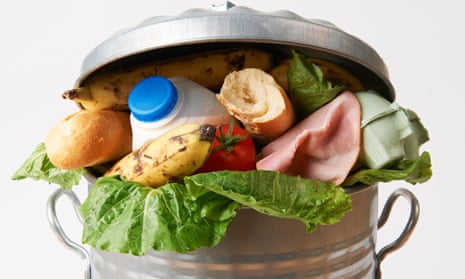UK households binned £13bn worth of food in 2015 that could have been eaten, according to new figures which suggest that progress in reducing the national food waste mountain has stalled.
Despite concerted efforts to reduce food waste through the entire supply chain, a new national update from the waste and recycling advisory body Wrap revealed that an estimated 7.3m tonnes of household food waste was thrown away in 2015 – up from 7m tonnes in 2012.
Of the food thrown away, 4.4m tonnes was deemed to be “avoidable” waste that was edible at some point before it was put in the bin or food waste caddy – such as bread that goes mouldy – compared with 4.2m tonnes in 2012. The rest were scraps that could not be eaten such as meat bones, eggshells, tea bags, coffee grounds, apple cores and fruit and vegetable peelings.
That meant the average UK household wasted £470 worth of food, which went in the bin when it could have been eaten. The avoidable food waste generated 19m tonnes of greenhouse gases over its lifetime – and preventing that pollution would be equivalent to taking one in four cars off UK roads, Wrap said.
It pointed to progress made since it started assembling detailed records and analysis nine years ago, but said that falls in food prices and rising incomes since 2014 had reduced the incentive for people to cut their food waste, halting a previous downward trend.
Between 2007 and 2012, the total amount of household food waste fell by 15%, and avoidable food waste dropped by 21%, thanks to rising food prices and changes to labelling to simplify use by date advice – alongside campaigning to raise awareness. But the latest figures show the food industry has failed to meet a commitment to cut household food waste by 5% between 2012 and 2015.
“Citizens are wasting 1m tonnes less food per year, which means over 8m tonnes less food waste than when we started tackling this issue in 2007,” said Wrap’s chief executive, Marcus Gover. “But it is incredibly challenging to reduce food waste, and the stalling of progress shows just how difficult it is.
“That’s why I’m calling on all businesses, organisations, campaigners and NGOs who work in this area to unite together in the fight against food waste. By working together we can win this battle.”
A regional breakdown shows significant progress in Wales – possibly due to a devolved administration and greater availability of council-run food waste collections – with a reduction in household food waste of 12% per person since 2009.
Trewin Restorick, founder and chief executive of the environmental charity Hubbub – which is helping deliver a major food waste project for Sainsbury’s in Derbyshire – said: “Seeing food waste grow again is massively disappointing and should be a wake-up call for efforts to be redoubled. Defra needs to copy the leadership being shown in Wales and Scotland.”
Sainsbury’s is nearing the end of a year-long experiment involving an entire town – Swadlincote in Derbyshire – where it regularly checks householders’ bins while trialling new technology such as smart fridges and food-sharing apps to help reduce waste.
Environment minister Therese Coffey said: “Good progress has been made by industry to tackle food and packaging waste in the supply chain. But we all have a role to play and despite a million-tonne fall in domestic food waste since 2007, there is clearly more we need to do.”
